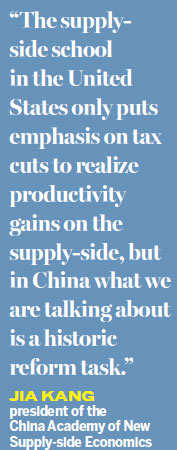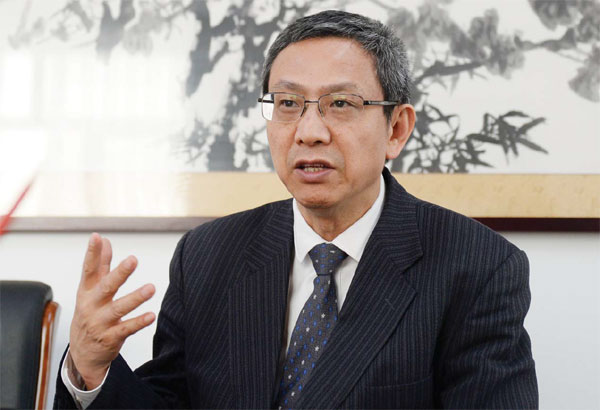Looking for theory to apply universally

Path-breaking economist says China's reforms should not be seen in either left-wing or right-wing terms
Jia Kang insists China's version of supply-side economics goes deeper than the so-called Reaganomics' tax-cutting and deregulation agenda implemented under US president Ronald Reagan in the 1980s.
The president of the China Academy of New Supply-side Economics, China's leading think tank researching the area, contests it goes right to the heart of the Chinese government's overall reform agenda.
| Jia Kang, president of the China Academy of New Supply-side Economics, says there is a general understanding among the people that supply-side reform offers long-term solutions and not just short-term ones. Wei Xiaohao / China Daily |
"The supply-side school in the United States only puts emphasis on tax cuts to realize productivity gains on the supply-side, but in China what we are talking about is a historic reform task," he says.
Jia, amiable and keen to engage in discussion, was speaking on the 17th floor of the Xinzhe Building, the headquarters of the Research Institute for Fiscal Science, part of the Ministry of Finance, in Beijing's Haidian district.
The offices are nearby the supply-side think tank, which was founded three years ago by Jia and other prominent academics including Bai Chongen, the Mansfield Freeman professor of economics at Tsinghua university, and Wang Qing, chief economist of Shanghai Chongyang Investment Management. Hong Qi, president of China Minsheng Banking Corp, China's biggest private bank, is its chairman.
Over recent months, the organization, in which more than 100 top Chinese economists are engaged, has come to international prominence, as the Chinese government has placed increasing emphasis on supply-side reforms as a central plank of its economic policy strategy.
This was particularly the case during the recent two sessions in Beijing of the National People's Congress, China's law-making body, and the Chinese People's Political Consultative Conference, the top political advisory body, which together ratify national policy.
Jia, 62, who has a ready sense of humor, does not seem fazed at all that what may otherwise be regarded as a backwater area of research has suddenly come with fame attached. He has recently been quoted in numerous international business publications.

"There is no doubt why it is fashionable since (Chinese President) Xi Jinping has expressed clearly the importance of this area and driven the message home repeatedly. I think there is a general understanding (among the people) that supply-side reform offers long-term solutions and not just short term ones," he says.
The renowned macro economist, who is a member of the National Committee of the CPPCC, is no stranger to meeting with China's top leaders.
He has been a member of the expert committee for the recently published 13th Five-Year Plan (2016-20) as well as the 11th and 12th plans before.
As president of the Research Institute for Fiscal Science, he has met with former president Hu Jintao as well as premiers going back to Zhu Rongji, who carried out one of the biggest shake-ups of state-owned enterprises in the 1990s when 30 million workers lost their jobs.
One of the key elements of the government's current supply-side reform is another shake-up of state-owned enterprises.
The government has announced there will be 1.8 million job losses over the next five years as its launches an attack on so-called zombie enterprises.
The problem for the economy is that state-owned enterprises are underperforming and acting as a drag on the economy. According to Gavekal Dragonomics, a Beijing-based economic research company, they had a rate of return on assets in 2014 of just 4.6 percent, almost half that of the 9.1 percent of the private sector.
Another key element of supply-side reform is of hukou, the household registration system, allowing migrant workers to bring their families and have more established lives in the cities - seen as an essential labor market reform.
"Such factors as these are obviously part of our consideration, but what we are interested in is something about the overall design of the economy, involving all the actors," he says.
Jia, winner in China of two major economic prizes, the Sun Yefang (named after the 20th century pioneering Chinese economist) and the Mundell-Huang, is looking to establish a fundamental, overarching theory of new supply-side economics.
"All the major developments in economic history have happened on the supply-side of the economy. This includes the agricultural revolution, the industrial revolution and the information technology revolution. These were all fundamental changes in the supply-side of the economy.
"In China, we have to seize the supply-side as the key to modernizing the economic system and overcoming difficulties."
The Economist, The New York Times and other international publications have drawn attention to the apparent contradiction of a still centrally planned Chinese economy drawing inspiration from right-wing Western figures such as Reagan and former UK prime minister Margaret Thatcher, who privatized state-owned industries and took on trade unions to liberate labor markets in the UK and was much influenced by supply-side thinking.
Jia says China's supply-side reforms should not be seen in either left-wing or right-wing terms.
"We don't label ourselves as left or right. We want to absorb as much as possible. I agree with neo-liberalism theories that the market is crucial for resource allocation and plays a determinate role. However, I don't agree that neo-liberalism is a perfect competition model. It is actually incomplete competition."
Jia, who was born in Wuhan in Central China but moved to Beijing at the age of 1, was the son of university educated government cadres. His father graduated from Nankai University in Tianjin before joining the revolution in 1949.
At 14, while at middle school, Jia was sent with his parents to Shayang in Hubei province to do agricultural work during the "cultural revolution" (1966-76).
He went on to join the army in Jiangxi province in Southeast China before working in a Beijing mining machinery factory.
It was there that he developed an interest in economics and began reading Karl Marx's Das Capital.
"In the 1970s, the government did encourage people to study Marxism but Capital was a very thick work and a lot of people were afraid of reading it. The fundamental theory is still very enlightening. There are Marxist elements to supply-side reform. For example, the progress of society is through the power of productivity," he says.
When the universities reopened after the "cultural revolution", Jia studied economics at the Beijing Economics Institute (now the University of International Business and Economics).
Both his master's and doctorate degrees were awarded by the Research Institute for Fiscal Science, where he spent more than three decades, apart from a year in the 1980s as a visiting scholar at the University of Pittsburgh.
Jia's intellectual influences include the founding father of modern supply-side economics, the French classical economist of the late 18th and early 19th centuries, Jean-Baptiste Say, whose famous law is often summarized as "supply creates its own demand".
This means that it is the supply of goods and services that creates demand in the economy, and not demand generating the supply.
"If you didn't have Apple products you would have no demand for Apple products. We get Apple products from the supply-side, and we cannot get them for the supply-side.
"If China wants to produce something similar to Apple then it has to solve the institutional supply issues and deal with various barriers to innovation or whatever and overcome them. That is the real issue."
Other influences include the Hungarian economist Janos Kornai, whose work looked at the shortages of supply in centrally planned Eastern European economies; the US Nobel Prize winner Douglass North, who emphasized the institutional factors that governed economies; and the British economist Ronald Coase, one of the famous Chicago school of economists, whose work focused on how over regulation damaged market economies.
"I started paying a lot of attention to Kornai's work on shortages in the 1980s and those from the institutional school of economics that said institutional factors played a role in the economy. These have helped me form my view of supply-side economics," he says.
Jia says one of the aims of the think tank is to come up with a general theory of supply-side economics that would apply universally.
He is looking to merge strands from a range of economics disciplines, including development, behavior and institutional economics.
"That is why we use the word 'new' in our title. We want to develop a new form of supply-side economics that is not only applicable to China but all over the world."
Contact the writers through andrewmoody@chinadaily.com.cn
(China Daily European Weekly 03/25/2016 page8)
Today's Top News
- Takaichi must stop rubbing salt in wounds, retract Taiwan remarks
- Millions vie for civil service jobs
- Chinese landmark trade corridor handles over 5m TEUs
- China holds first national civil service exam since raising eligibility age cap
- Xi's article on CPC self-reform to be published
- Xi stresses improving long-term mechanisms for cyberspace governance































